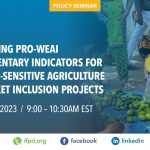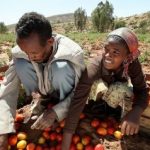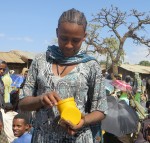Ethiopian agriculture in the news for the period February 16 - 28, 2023 highlighting current stories in agriculture and related topics in the country. Read more>>
Introducing pro-WEAI complementary indicators for nutrition-sensitive agriculture and market inclusion projects
IFPRI Policy Seminar Thursday March 02, 2023 9:00AM to 10:30AM EST Details and Registration
The gendered impacts of index-insurance on food-consumption: Evidence from southern Ethiopia
Journal Article. Index insurance has been promoted as an innovative strategy for enhancing long-term resilience to climate-related shocks and providing financial inclusion, particularly to poor women farmers in developing countries. In this paper, we evaluate the gendered impact of an index-based livestock insurance product on food consumption among pastoral households in southern Ethiopia. We exploit […]
School-based nutrition interventions had impacts on dietary diversity and meal frequency of adolescent girls in Ethiopia
Abstract. Adolescence is a critical period of physical and psychological development, especially for girls as poor nutrition can affect their well-being as well as the well-being of their children. In Ethiopia, where the population is very young, evidence on the nutrition of adolescent girls and their determinants is scant. We tested the impact of a […]
Food safety and incipient modern value chains: Evidence from milk in Ethiopia
Journal Article. Modern marketing arrangements are increasingly being implemented to assure improved food quality and safety. However, it is not well known how these modern marketing arrangements perform in early stages of roll-out. We study this issue in the case of rural–urban milk value chains in Ethiopia, where modern processing companies—selling branded pasteurized milk—and modern […]
- « Previous Page
- 1
- …
- 58
- 59
- 60
- 61
- 62
- …
- 102
- Next Page »




